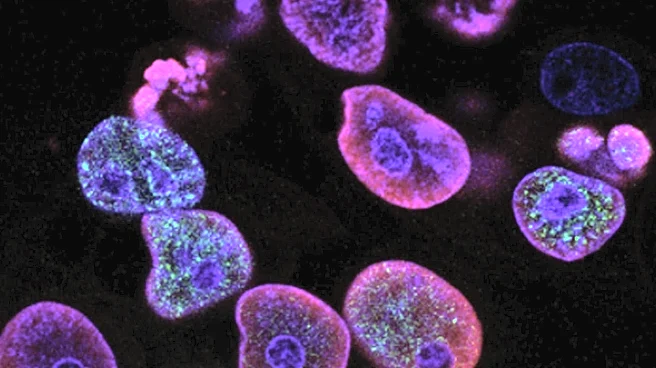What's Happening?
Researchers at Karolinska Institutet, in collaboration with the Department of Pathology at Karolinska University Hospital, have discovered that pancreatic tumor cells can grow into damaged parts of normal pancreatic tissue, creating their own environment. This study, published in Nature Communications, involved samples from 108 patients who underwent surgery at Karolinska University Hospital. The findings reveal that tumor cells adapt to their environment, exhibiting different characteristics in damaged areas compared to the connective tissue-rich parts of the tumor. The damaged areas contain support cells expressing the protein NGFR, linked to the healing process of damaged tissue. This discovery may influence how tumors develop and respond to treatment.
Why It's Important?
The study's findings are significant as they provide insight into the behavior of pancreatic tumor cells, which could impact treatment strategies. Understanding how tumor cells exploit damaged tissue to create growth environments may lead to more effective therapies targeting these specific conditions. The research highlights the importance of considering the microenvironment in cancer treatment, potentially leading to improved survival rates for pancreatic cancer, which have remained low compared to other cancers. This could benefit patients by offering new avenues for therapeutic intervention and improving outcomes.
What's Next?
Future research may focus on developing treatments that target the specific conditions created by tumor cells in damaged tissue. This could involve exploring therapies that inhibit the expression of proteins like NGFR, which are linked to the healing process and tumor development. Additionally, the study suggests a need for further investigation into how these environments affect treatment response, potentially leading to personalized medicine approaches for pancreatic cancer patients.
Beyond the Headlines
The study raises ethical considerations regarding the treatment of pancreatic cancer, emphasizing the need for personalized approaches that consider the unique microenvironment of each tumor. It also highlights the importance of interdisciplinary collaboration in advancing cancer research, as demonstrated by the partnership between Karolinska Institutet and other institutions.








